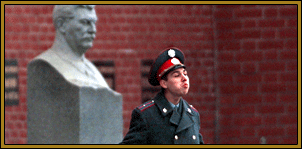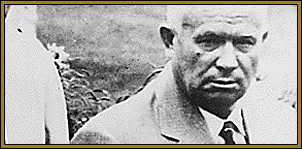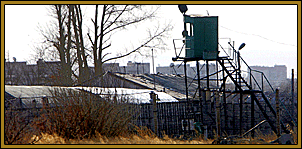 |
 |
|||||||||||||
 |
President Bush, during a meeting with Russian President Vladimir Putin last September, said, "Democracy just doesn't happen, it grows. It takes a while. That's the experience of our country. That's the experience of the Russian federation." Yet in Russia, more than 14 years after the collapse of the Soviet Union, it is unclear whether the democratic promise of that country's post-Soviet revolution has fully grown. Putin's critics say he has accumulated too much power, that Russia's historical penchant for "rule by the iron fist" is creeping back into play. Hovering over these concerns are still fresh memories of Russia's past, where repression defined the Soviet way of life. Fifty years ago, on February 25, 1956, Nikita Khrushchev, the former Kremlin leader, revealed and denounced, for the first time in the history of the Soviet Union, the crimes of his predecessor, Joseph Stalin. Khrushchev condemned Stalin in a secret speech at the 20th congress of the Soviet Communist party. |
 |
|||||||||||
|
|||||||||||||
 |
A Political Act of Volcanic Proportions "It seems to me that the secret speech changed the Soviet Union and the world," says William Taubman, a Khrushchev biographer. "It was the beginning of the end of the Soviet Union and the beginning of the end of communism as a doctrine, as an ideology, which commanded the loyalty of millions around the world. I would say that it was one of the single most important events of the 20th century." |
Read an English translation of Khrushchev's "secret speech." Khrushchev's secret speech stirred the hopes of Russian artists and intellectuals who yearned for greater freedom of expression. Thus awakened, a human rights movement developed in the '60s and '70s. The Communist Party controlled what people said in public, but the lyrical voices of that movement, a generation of dissident singers, discovered their refrains of dissent could slip through on a ribbon of magnetic tape.
I grew up during the 1960s. But for reasons I still don't fully understand, I wasn't especially emotionally connected to the political turmoil that roiled the United States back then. Instead, I was moved by a handful of brave souls who made up the human rights movement in the USSR.
|
|||||||||||
 |
A Betrayal of the Promise
Winston Churchill said that Russia is a riddle, wrapped inside a mystery, inside an enigma. All the more so in uncertain times, such as they were after Nikita Khrushchev denounced Joseph Stalin and his cult of personality. Khrushchev staked everything on that bold rhetorical act. And all Soviet Russia would feel the fallout. |
||||||||||||
 |
For millions of Russians, Nikita Khrushchev's secret speech had palpable consequences. The lucky ones who survived Stalin's terror came home from the labor camps. One Russian poet wrote, "Now people will come back from the prisons, and two Russias will look into each other's eyes, the one that imprisoned, and the one that was imprisoned. A new epoch starts." An epoch ultimately marked by repression. |
||||||||||||
 |
|||||||||||||
|
|||||||||||||
